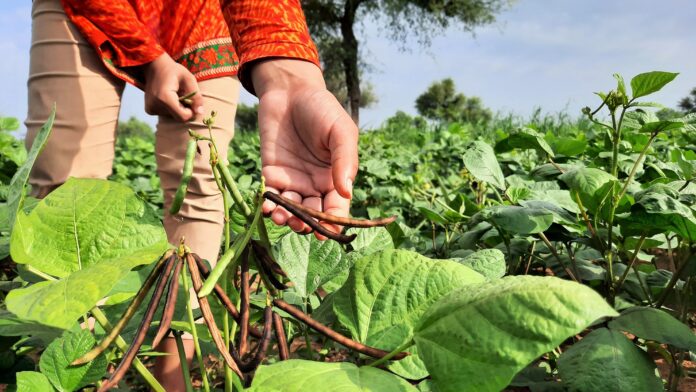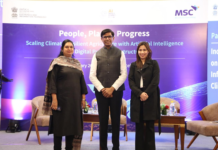
In a food system, growing crops isn’t the end of the story; it’s not even the beginning. Before crops can be grown, seeds and other inputs must be purchased. After the harvest, crops may be processed or refined before moving to wholesale markets. Finally, food arrives in restaurants and grocery stores, where it’s purchased and eaten by consumers. Just like arteries in the human body, value chains bring food from the farmgate to consumer plates, playing a crucial role in determining what is grown and eaten.
A new project at the Tata-Cornell Institute for Agriculture and Nutrition (TCI) aims to bolster Indian food value chains in support of the diversification of the country’s food system. TCI researchers say that diversification is key to overcoming India’s stubbornly high malnutrition rates and making its food system resilient in the face of climate change, but value chains for nonstaple crops need strengthening. Food value chains encompass the full range of activities and processes that bring food from the farm to the consumer plate. Value is added and maintained at every step, including production, processing, distribution, marketing and consumption.
“As food moves from farm to fork, there are numerous opportunities to increase efficiency, reduce waste and generate economic opportunities for India’s smallholder farmers,” TCI director Prabhu Pingali said. “This exciting new project will identify those opportunities and provide policymakers with information to build and bolster value chains for nutritious, climate-smart crops.”
As part of the ‘Promoting Value Chains for Climate Resilience and Nutritious Diets’ project, TCI researchers will map and analyze the value chains for key nonstaple food groups—coarse grains, horticultural produce, pulses and oilseeds. In particular, they will focus on millets, tomatoes, pulses and soybeans. Through their analysis, they will identify challenges and inefficiencies along the value chains and recommend options for addressing them.
Researchers will also consult with key stakeholders in the relevant value chains, including policymakers, scientists and civil society organizations. These consultations will reveal key areas of focus and confirm the validity of proposed interventions.
The project is supported by a 5 million Danish kroner grant from the Novo Nordisk Foundation.
“The Novo Nordisk Foundation is looking to India to partner on the sustainable food system agenda with a specific focus on climate and nutrition,” Jakob Ørberg, a senior scientific lead at the Novo Nordisk Foundation, said. “TCI’s repository of work on agriculture value chains and the work supported under this project is an important and actionable knowledge base for this agenda.”
India’s food system faces mounting challenges, namely feeding a growing population and curbing high malnutrition rates. Current policies incentivize rice and wheat production to ensure that people don’t go hungry, but the latest surveys show that 32% of children under the age of 5 are underweight, 57% of women are anemic and there is a worrying trend of rising obesity among both adults and children. The growing risk of climate change adds to the stress on the food system, as rising temperatures and more frequent extreme weather events threaten crop yields.
TCI researchers point to crop diversification as a solution for those challenges. Reducing the amount of rice and wheat grown while increasing production of micronutrient and protein-rich crops, like vegetables and beans, could reduce malnutrition. Producing crops that are well-suited to harsh climates, such as coarse grains and pulses, could also make India’s food system more resilient against climate change while lowering greenhouse gas emissions.
Diversifying India’s agricultural system requires increasing the yields of such nonstaple crops. Establishing strong value chains for those crops is critical for increasing yields, according to researchers. Value chains for rice and wheat are robust and extensive because India’s agricultural policies incentivize their production. By comparison, value chains for coarse grains, horticultural produce, pulses and oilseeds are not as well-developed. TCI’s research project aims to help policymakers rectify this situation.
“Properly established value chains help connect farmers with markets, allow for price discovery, provide critical infrastructure and ensure economic incentives,” Pingali said. “Developing strong, efficient value chains for diverse crops is an integral step in building a climate-friendly food system and making nutritious foods more accessible, available and affordable.”
Based in Cornell University’s campus in Ithaca, New York, the Tata-Cornell Institute for Agriculture and Nutrition (TCI) is a long-term research initiative that develops and assesses innovative, food systems-based approaches to reducing poverty and improving nutrition and livelihoods in the developing world, with a specific focus on India.
IndiFoodBev — authentic, impactful and influential
An English-language food and beverage processing and packaging industry B2B platform in print and web, IndiFoodBev is in its third year of publication. It is said that the Indian food and beverage industries represent approximately US$ 900 billion in revenues which implies more than 20% of the country’s GDP. Eliminating the wastage on the farmside can help to deliver more protein to a higher number of the population apart from generating sizable exports. The savings in soil, seeds, water, fertilizer, energy and ultimately food and nutrition could be the most immense contribution that country is poised to make to the moderation of climate change.
To improve your marketing and grow sales to the food and beverage processing and packaging industry, talk to us. Our research and consulting company IppStar [www.ippstar.org] can assess your potential and addressable markets in light of the competition. We can discuss marketing, communication, and sales strategies for market entry and growth.
Suppliers and service providers with a strategy and budget for targeted marketing can discuss using our hybrid print, web, video, and social media channels to create brand recognition linked to market relevance. Our technical writers are ready to meet you and your customers for content.
The second largest producer of fruit and vegetables in the world is continuously expanding processing capacities and delivery systems with appropriate innovative technologies. We cover product and consumer trends, nutrition, processing, research, equipment and packaging from farm to thali. Get our 2025 media kit and recalibrate your role in this dynamic market. Enhance your visibility and relevance to existing markets and turn potential customers into conversations. Ask for a sample copy of our bi-monthly in print or our weekly IndiFoodBev eZine each Wednesday.
For editorial info@ippgroup.in — for advertisement ads1@ippgroup.in and for subscriptions subscription@ippgroup.in
Naresh Khanna – 10 February 2025
Subscribe Now










